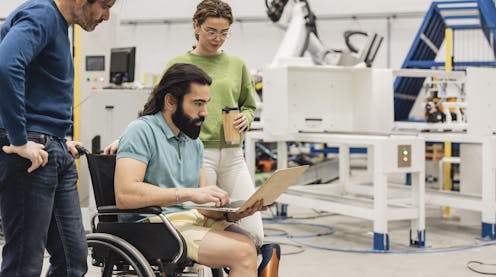Job supervisors with disabilities can boost productivity, new research shows
- Written by Dustin Cole, Assistant Professor of Supply Chain Management, Auburn University

Some large companies, such as[1] Walgreens[2], Wells Fargo[3] and Proctor & Gamble[4], are successfully integrating people with disabilities into their labor forces.
But other employers are not doing as good a job. That means they’re losing out on what the roughly 6.5% of the U.S. workforce[5] with some form of disability might have to offer amid a tight labor market[6].
One potential solution is to employ more managers with disabilities.
I’m a supply chain scholar[7] who joined forces with two colleagues, Sriram Narayanan[8] and Shawnee Vickery[9], for a research project on this issue. We found that when teams include people with disabilities alongside co-workers without disabilities, productivity can be higher – particularly when their supervisors have a disability[10].
Dustin Cole discusses his research about disabilities in the workplace.More understanding and less task-switching
Our research team reviewed daily production data from a manufacturing-focused nonprofit that employs people with and without disabilities both as workers and supervisors.
We found that when there is a substantial number of people with disabilities working together, their productivity was higher when supervisors had a disability compared with similar teams where the supervisor did not have a disability. For example, if there were 10 workers with a disability, it would take roughly 3% less time to produce a garment when there was a leader with a disability present compared with when there was not.
We also interviewed workers and supervisors with and without disabilities employed by that same nonprofit, employed at a similar organization and working at a for-profit distribution center to find out what might be behind this improvement. We found two common themes, regardless of what kind of disability the supervisor or their workers had.
As you might suspect, workers with disabilities had an easier time talking about their disability when their supervisors also had disabilities.
“We had a couple of managers who had a full leg replacement where, you know, the mobility issues are easier to talk about as a group and they do bubble to the surface a little bit faster,” one worker said.
“They at least understand I’m struggling,” said another worker with a disability. A supervisor with a disability can understand “that I’m not lazy; that I’m not just making things up to get out of work.”
We also found that supervisors with disabilities tended to keep workers performing a single task for longer periods of time, rather than moving them between different tasks.
That approach bucks conventional wisdom. Many operations management experts prefer to move workers from one task to another. Known as “cross-training,” this approach can increase worker engagement[11] and make it easier for employers to quickly adapt[12] to changes.
Resoundingly Human: Making workplaces more inclusive for all.
Making adjustments
We believe that employers should heed our findings for several reasons. A big one is that the number of people with a disability in the U.S. workforce is rising quickly. It grew by more than 40%[13] in the decade before July 2024, to about 8 million Americans.
An aging population in the U.S.[14] and around the world[15] is partly behind this growth. And older people tend to have more disabilities[16] than younger workers, such as arthritis and heart conditions.
This need to accommodate more older workers has led many employers, such as German automaker BMW[17], to reconsider how they structure their jobs. These types of changes are also occurring in the U.S.
For example, Minneapolis-based Dotson Iron Casting[18] has made efforts to make manufacturing work more accommodating for an aging workforce by using robotic lift machines to move parts so workers no longer need to carry them between machines. Alexandria Industries, which makes metal components[19], has taken a different approach by focusing on flexible schedules for older workers.
As more companies and other employers hire more people with disabilities, our research indicates that they will also need to adopt new approaches to the way they operate.
References
- ^ such as (www.walgreens.com)
- ^ Walgreens (disabilityin.org)
- ^ Wells Fargo (disabilityin.org)
- ^ Proctor & Gamble (us.pg.com)
- ^ 6.5% of the U.S. workforce (data.census.gov)
- ^ tight labor market (www.uschamber.com)
- ^ supply chain scholar (scholar.google.com)
- ^ Sriram Narayanan (broad.msu.edu)
- ^ Shawnee Vickery (broad.msu.edu)
- ^ supervisors have a disability (doi.org)
- ^ increase worker engagement (doi.org)
- ^ make it easier for employers to quickly adapt (doi.org)
- ^ It grew by more than 40% (fred.stlouisfed.org)
- ^ aging population in the U.S. (www.census.gov)
- ^ around the world (www.weforum.org)
- ^ older people tend to have more disabilities (www.forbes.com)
- ^ such as German automaker BMW (hbr.org)
- ^ Minneapolis-based Dotson Iron Casting (www.startribune.com)
- ^ Alexandria Industries, which makes metal components (www.bbc.com)







